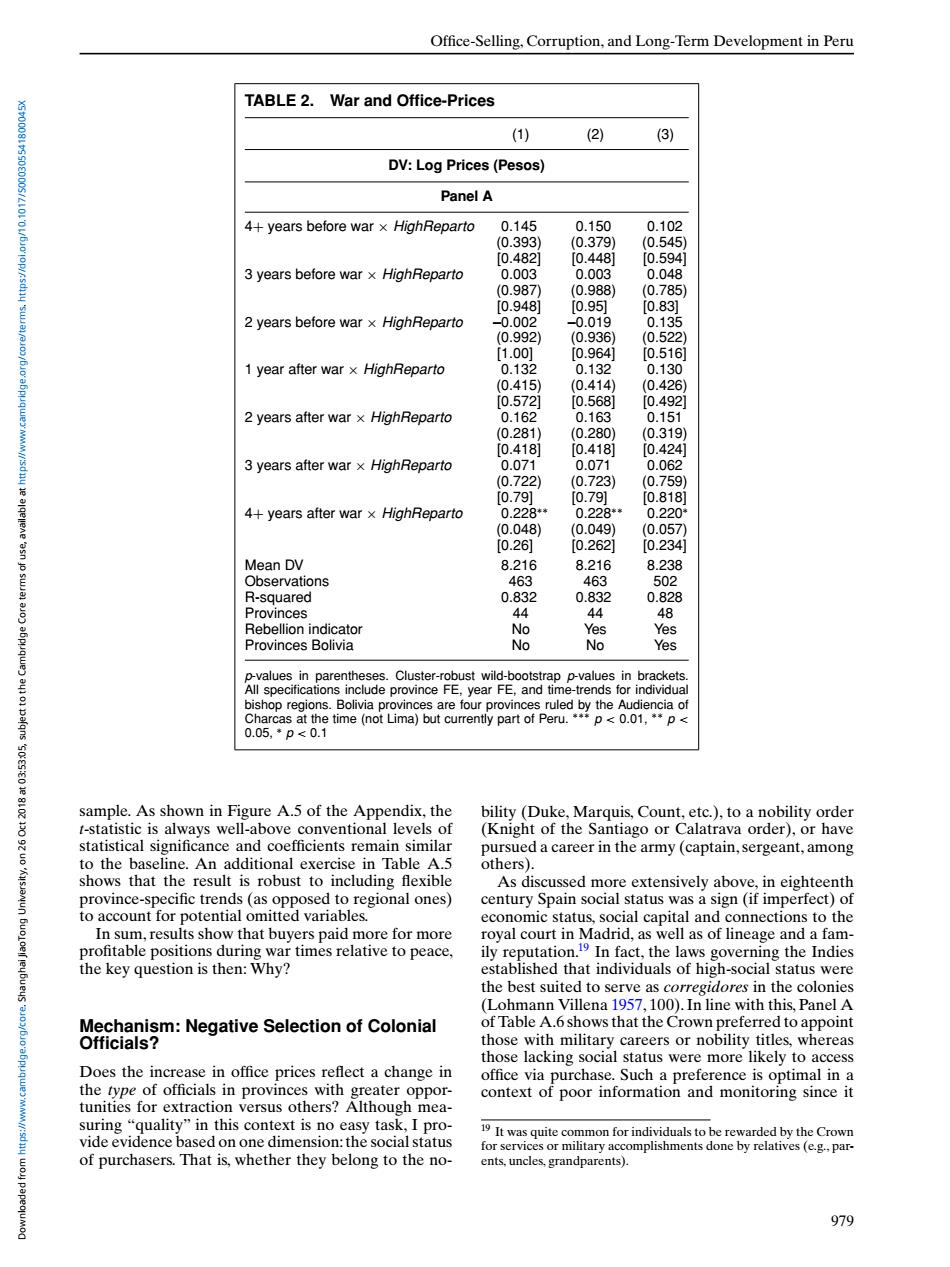正在加载图片...

Office-Selling,Corruption,and Long-Term Development in Peru TABLE 2.War and Office-Prices (1) (2) (3) DV:Log Prices(Pesos) Panel A 4+years before war x HighReparto 0.145 0.150 0.102 (0.393) (0.379) (0.545) 「0.4821 0.4481 0.5941 3 years before war x HighReparto 0.003 0.003 0.048 (0.987 (0.988) (0.785) f0.948 0.951 「0.831 2 years before war x HighReparto -0.002 -0.019 0.135 (0.992) (0.936) (0.522) f1.001 0.9641 0.5161 1 year after war x HighReparto 0.132 0.132 0.130 (0.415) (0.414) (0.426) f0.5721 [0.5681 「0.4921 2 years after war x HighReparto 0.162 0.163 0.151 (0.281) (0.280) (0.319) [0.4181 [0.4181 「0.4241 3 years after war x HighReparto 0.071 0.071 0.062 (0.722) (0.723) (0.759) [0.79 [0.79] [0.8181 4+years after war x HighReparto 0.228* 0.228** 0.220* (0.048) (0.049) (0.057) [0.26] [0.262] [0.234 Mean DV 8.216 8.216 8.238 Observations 463 463 502 R-squared 0.832 0.832 0.828 Provinces 44 44 48 Rebellion indicator No Yes Yes Provinces Bolivia No No Yes p-values in parentheses.Cluster-robust wild-bootstrap p-values in brackets. All specifications include province FE,year FE,and time-trends for individual e2sanepoetarcm88ogeamop0baHpe60ereg 0.05,*p<0.1 sample.As shown in Figure A.5 of the Appendix,the bility (Duke,Marquis,Count,etc.),to a nobility order t-statistic is always well-above conventional levels of (Knight of the Santiago or Calatrava order),or have statistical significance and coefficients remain similar pursued a career in the army(captain,sergeant,among to the baseline.An additional exercise in Table A.5 others). shows that the result is robust to including flexible As discussed more extensively above,in eighteenth province-specific trends(as opposed to regional ones) century Spain social status was a sign (if imperfect)of to account for potential omitted variables. economic status,social capital and connections to the In sum,results show that buyers paid more for more royal court in Madrid,as well as of lineage and a fam- profitable positions during war times relative to peace, ily reputation.19 In fact,the laws governing the Indies the key question is then:Why? established that individuals of high-social status were the best suited to serve as corregidores in the colonies (Lohmann Villena 1957,100).In line with this,Panel A Mechanism:Negative Selection of Colonial of Table A.6 shows that the Crown preferred to appoint Officials? those with military careers or nobility titles,whereas those lacking social status were more likely to access Does the increase in office prices reflect a change in office via purchase.Such a preference is optimal in a the type of officials in provinces with greater oppor- context of poor information and monitoring since it tunities for extraction versus others?Although mea- suring "quality"in this context is no easy task,I pro- vide evidence based on one dimension:the social status 19It was quite common for individuals to be rewarded by the Crown for services or military accomplishments done by relatives(e.g.,par- of purchasers.That is,whether they belong to the no- ents,uncles,grandparents). 979Office-Selling, Corruption, and Long-Term Development in Peru TABLE 2. War and Office-Prices (1) (2) (3) DV: Log Prices (Pesos) Panel A 4+ years before war × HighReparto 0.145 0.150 0.102 (0.393) (0.379) (0.545) [0.482] [0.448] [0.594] 3 years before war × HighReparto 0.003 0.003 0.048 (0.987) (0.988) (0.785) [0.948] [0.95] [0.83] 2 years before war × HighReparto –0.002 –0.019 0.135 (0.992) (0.936) (0.522) [1.00] [0.964] [0.516] 1 year after war × HighReparto 0.132 0.132 0.130 (0.415) (0.414) (0.426) [0.572] [0.568] [0.492] 2 years after war × HighReparto 0.162 0.163 0.151 (0.281) (0.280) (0.319) [0.418] [0.418] [0.424] 3 years after war × HighReparto 0.071 0.071 0.062 (0.722) (0.723) (0.759) [0.79] [0.79] [0.818] 4+ years after war × HighReparto 0.228∗∗ 0.228∗∗ 0.220∗ (0.048) (0.049) (0.057) [0.26] [0.262] [0.234] Mean DV 8.216 8.216 8.238 Observations 463 463 502 R-squared 0.832 0.832 0.828 Provinces 44 44 48 Rebellion indicator No Yes Yes Provinces Bolivia No No Yes p-values in parentheses. Cluster-robust wild-bootstrap p-values in brackets. All specifications include province FE, year FE, and time-trends for individual bishop regions. Bolivia provinces are four provinces ruled by the Audiencia of Charcas at the time (not Lima) but currently part of Peru. ∗∗∗ p < 0.01, ∗∗ p < 0.05, ∗ p < 0.1 sample. As shown in Figure A.5 of the Appendix, the t-statistic is always well-above conventional levels of statistical significance and coefficients remain similar to the baseline. An additional exercise in Table A.5 shows that the result is robust to including flexible province-specific trends (as opposed to regional ones) to account for potential omitted variables. In sum, results show that buyers paid more for more profitable positions during war times relative to peace, the key question is then: Why? Mechanism: Negative Selection of Colonial Officials? Does the increase in office prices reflect a change in the type of officials in provinces with greater opportunities for extraction versus others? Although measuring “quality” in this context is no easy task, I provide evidence based on one dimension: the social status of purchasers. That is, whether they belong to the nobility (Duke, Marquis, Count, etc.), to a nobility order (Knight of the Santiago or Calatrava order), or have pursued a career in the army (captain, sergeant, among others). As discussed more extensively above, in eighteenth century Spain social status was a sign (if imperfect) of economic status, social capital and connections to the royal court in Madrid, as well as of lineage and a family reputation.19 In fact, the laws governing the Indies established that individuals of high-social status were the best suited to serve as corregidores in the colonies (Lohmann Villena 1957, 100). In line with this, Panel A of Table A.6 shows that the Crown preferred to appoint those with military careers or nobility titles, whereas those lacking social status were more likely to access office via purchase. Such a preference is optimal in a context of poor information and monitoring since it 19 It was quite common for individuals to be rewarded by the Crown for services or military accomplishments done by relatives (e.g., parents, uncles, grandparents). 979 Downloaded from https://www.cambridge.org/core. Shanghai JiaoTong University, on 26 Oct 2018 at 03:53:05, subject to the Cambridge Core terms of use, available at https://www.cambridge.org/core/terms. https://doi.org/10.1017/S000305541800045X